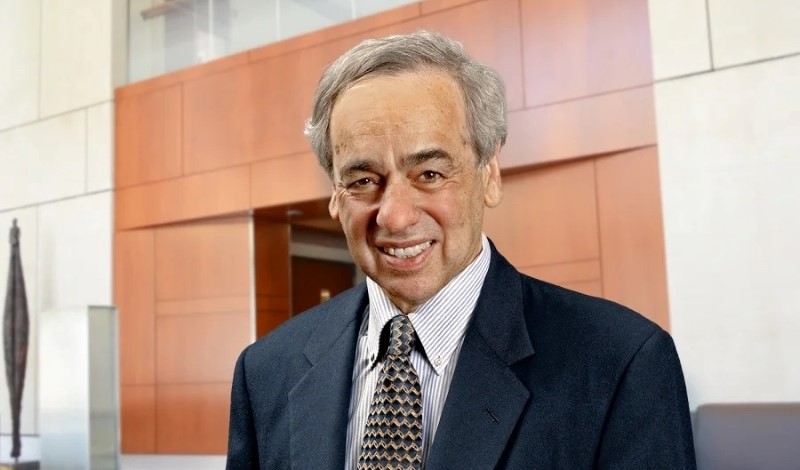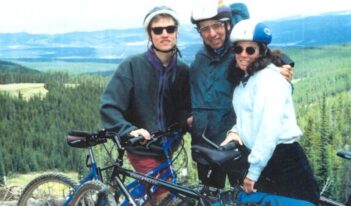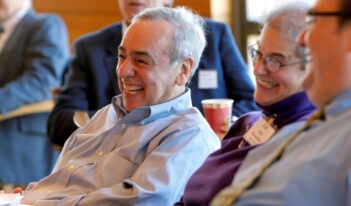
Howard Kunreuther was a pivotal influence on the direction of my research and career.
Howard was one of the most important influences on the course of my career. Shortly after I arrived at Penn in 1974, he was running what we now call a lab meeting, which I attended, along with Jack Hershey and others. This was a major cause of my increased interest in JDM (judgment and decision-making) as a research area. The lab meeting, over the years, morphed into the “decision processes brown bag,” and then it received funding from the Marketing Department, where this regular seminar series still lives, alongside other lunchtime meetings.
I collaborated with Howard several times over the years, and it was always a good experience. Some of these collaborations grew out of a program project National Science Foundation (NSF) grant that we received around 1988, which also included Jack Hershey and others. Later, we co-supervised a graduate student, Min Gong, who made everything fun.
As a collaborator with me, Howard’s style was to be very encouraging at the beginning. Every idea I had was great. I already thought his were. But then, when it got to the nitty gritty, he became a tiger, going through draft after draft of the paper, editing and commenting. He even edited stuff he had written himself in the last draft. He was not one of those co-authors who puts his name on something without giving it his full attention.
He was always asking of me, in discussing my research: “But what are the prescriptive implications?” He pushed me farther in that direction than I would have gone on my own. I always wanted my research to be “relevant,” but I often failed to make the reader see that when I wrote a paper. Of course he had some really good ideas for applications, some of which were adopted, as mentioned in other tributes in this series in The Regulatory Review.
A major event for me—if not for Howard—was a grant application we submitted in 1995 for a National Center for Environmental Decision-Making Research, responding to a request for proposals by the NSF and the U.S. Environmental Protection Agency (EPA). Howard enlisted the help of many people around the university and elsewhere, some of whom have also contributed to this series of tributes, such as Eric Orts, Jack Hershey, and Danny Kahneman. Howard asked me to help, so he and I were co-PIs. He put the team together, and I put the proposal together, with help, of course.
When it became clear that we were chosen as one of two teams (out of many) that received site visits, and the other was a team with what I thought had very weak records, it looked like we were going to get the grant. Howard and I would be co-directors. I figured that this would be the rest of my career, and I was already looking at possible office space. We had lots of good ideas, some of which still have not been implemented, although I see discussions of them occasionally, such as deep assessment of human values for nature beyond “charismatic megafauna.”
In the end, we did not get selected. After the site visit, the final reviewers decided that they wanted something much more inclusive. We had left out climate change. That was a true mistake on our part. The reviewers at NSF and EPA also thought, though, that dissemination by the World Wide Web, which we proposed to do, would not be accessible to the public!
After this unfortunate outcome, Howard, optimist as ever, enlisted Roger Kasperson to help put together a new proposal, so we all had a couple of meetings at Clark University in Worcester, Massachusetts. There was no specific request for proposals to respond to, and so this effort did not go anywhere. But Howard’s perseverance and collaborative spirit following this experience revealed so well his great strengths as an intellectual leader.
Howard is an important person in the history of JDM, and he is often not acknowledged enough for that, partly because he was more involved in other groups. He truly set an example for how to do policy-relevant research and then follow through on it, long before the present enthusiasm for “nudge units” and behavioral research departments in governments and corporations.
Howard was also a personal friend. I hired his daughter, Laura, to help with some research one summer (and I have followed her career after that). Later, Howard acted as the sponsor of my son, David, who had to do a project outside of school in his senior year of high school. It ended up being a paper about probabilistic weather forecasts.
Unfortunately, I did not get to see much of Howard after the pandemic started. I have missed him very much as a colleague and a friend.
This essay is part of a series celebrating the life and scholarship of Howard Kunreuther, titled “Commemorating Howard Kunreuther.”




